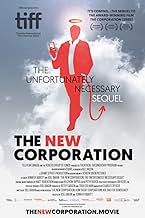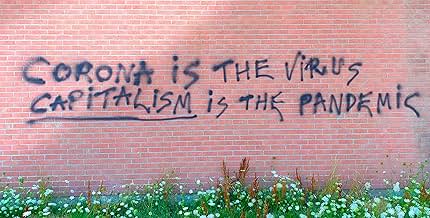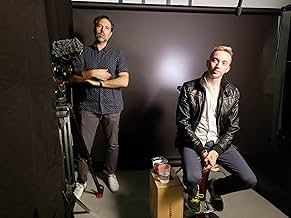Exposes how companies are desperately rebranding as socially responsible - and how that threatens democratic freedoms.Exposes how companies are desperately rebranding as socially responsible - and how that threatens democratic freedoms.Exposes how companies are desperately rebranding as socially responsible - and how that threatens democratic freedoms.
- Awards
- 1 win & 8 nominations total
- Directors
- Writer
- All cast & crew
- Production, box office & more at IMDbPro
Featured reviews
After watching the corporation (2003) before this sequel, I'm not sure how these two documentaries can be comparable to each other. One describes in depth what corporations are and how they have impacted the world, while this new film doesn't speak of corporations almost at all.
We all know from the first film what corporations have done, and other documentaries have informed us of the culmination of what happens in a society that is now corporate controlled. I'm talking about the financial crisis movies that have shown what corps can do with their power. As well as the social dilemma, and Edward Snowden docs which highlight what corporations are doing which is mining our information. Finally climate docs which highlight how unchecked stripping of resources destroys ecosystems.
This documentary however is basically an overview of what we know and what has been released previously, while also giving an overview of recent historical uprisings/protests.
Overall I really don't think this doc was as informative and crucial as the first. We all know by now that corps control the world, and that the gap between the haves and the have nots is widening. This doesn't give much insight as to the change that is suggested throughout. Intense capitalism and intense socialism are the current state of affairs, and will be until there is a state which doesn't value competition between anyone, at all.
Only a certain amount of $ and collectivism can do that. So all out socialism can only work through a manifestation of current capitalism to suit the collective. Those with the most power are the only ones that can do this, so siding against the corps (which seems to be the message here) isn't going to do any good, imho.
Ricky Meffe review. Twitter: Rickymeffe
We all know from the first film what corporations have done, and other documentaries have informed us of the culmination of what happens in a society that is now corporate controlled. I'm talking about the financial crisis movies that have shown what corps can do with their power. As well as the social dilemma, and Edward Snowden docs which highlight what corporations are doing which is mining our information. Finally climate docs which highlight how unchecked stripping of resources destroys ecosystems.
This documentary however is basically an overview of what we know and what has been released previously, while also giving an overview of recent historical uprisings/protests.
Overall I really don't think this doc was as informative and crucial as the first. We all know by now that corps control the world, and that the gap between the haves and the have nots is widening. This doesn't give much insight as to the change that is suggested throughout. Intense capitalism and intense socialism are the current state of affairs, and will be until there is a state which doesn't value competition between anyone, at all.
Only a certain amount of $ and collectivism can do that. So all out socialism can only work through a manifestation of current capitalism to suit the collective. Those with the most power are the only ones that can do this, so siding against the corps (which seems to be the message here) isn't going to do any good, imho.
Ricky Meffe review. Twitter: Rickymeffe
This is a well-produced documentary that starts off quite informatively by calling out how corporations use various methods to reinforce the narrative that they are socially responsible and helping the planet while simultaneously putting profits before anything. Great point made about how banks (JP Morgan is called out specifically) responsible for the 2008 crisis fancied themselves as "saviours" in the fallout by investing in a place like Detroit, where they stand to make a bundle either way. It also makes good points about corporate tax evasion and influence of their money in politics.
It really only tells one side of the story in most cases it studies however, which is a strongly socialist perspective. I'm not saying that's wrong as I myself support certain socialist ideas, but it's worth noting the politics of those being interviewed is overwhelmingly left-wing. As a result, it's more of a one-sided conversation, which is quite disappointing and a bit preachy to the viewer. As with any contemporary media these days, it also had to throw in a jab at Trump supporters because apparently they all support corporate greed and blame their struggles on minorities.
My biggest qualm is that in the last half or so it jumps from topic to topic, mostly socialist talking points, that are essentially unrelated to corporations aside from the Australian coal company. It's like I was watching a completely different documentary and it felt more like disorganized propaganda at that point.
First half, 7.5/10. Second half, 3/10. I really wish they would have gone into more depth on a couple of topics as opposed to just briefly giving left-leaning viewpoints on a cherry-picked assortment of social, economic, and political topics. It was reasonably interesting overall though, so it gets a 6.
It really only tells one side of the story in most cases it studies however, which is a strongly socialist perspective. I'm not saying that's wrong as I myself support certain socialist ideas, but it's worth noting the politics of those being interviewed is overwhelmingly left-wing. As a result, it's more of a one-sided conversation, which is quite disappointing and a bit preachy to the viewer. As with any contemporary media these days, it also had to throw in a jab at Trump supporters because apparently they all support corporate greed and blame their struggles on minorities.
My biggest qualm is that in the last half or so it jumps from topic to topic, mostly socialist talking points, that are essentially unrelated to corporations aside from the Australian coal company. It's like I was watching a completely different documentary and it felt more like disorganized propaganda at that point.
First half, 7.5/10. Second half, 3/10. I really wish they would have gone into more depth on a couple of topics as opposed to just briefly giving left-leaning viewpoints on a cherry-picked assortment of social, economic, and political topics. It was reasonably interesting overall though, so it gets a 6.
If you want to now how we got here and the terrible road we're headed down, watch this. If you're blinded by ideology and don't come away with something, then you're a lost cause. If not, this should galvanize you at least somewhat.
I really liked the original The Corporation, so I was excited about this follow up. However, as many have mentioned this sequel is less of a documentary and more of a socialist propaganda; even if you agree with everything that is said and presented here (and as a left leaning person myself, I totally do), it offers very little in terms of an actual unbiased look at corporations like the first film did. In the end worth the watch if you are on the left side of the political spectrum, but know that it might end up just being another piece of your echo chamber.
Even though I'm totally on the capitalism-hating boundwagon, it's still hard to rate this film as a documentary regarding an unbiased, neutral look at a relative subject. Being essentially an open love letter to Bernie Sanders, Alexandria Ocasio-Cortez and all socialist activists in the west world, and likewise zealously bashing and pounding on Amazon, Facebook, Google, etc, this film shouldn't be sorted as a documentary.
How this film works, however, is regarded as an essay film which theorises certain attributes towards the "giant" corporations and their devastating and deadly effects on the present world, just "for a few dollars more". In this standpoint, the film is a wholesome and comprehensive work for it points out several pitfalls and valid issues within those corporations, builds up a hypothesis to generalize their conducts, and in the final third part arrives at a fully fleshed-out solution.
If you are looking for a documentary presenting or representing facts and realities, then this film is likely to disappoint. But if you are looking for a totally biased explanation and analysis of our modern universe, then this is definitely something to consider.
How this film works, however, is regarded as an essay film which theorises certain attributes towards the "giant" corporations and their devastating and deadly effects on the present world, just "for a few dollars more". In this standpoint, the film is a wholesome and comprehensive work for it points out several pitfalls and valid issues within those corporations, builds up a hypothesis to generalize their conducts, and in the final third part arrives at a fully fleshed-out solution.
If you are looking for a documentary presenting or representing facts and realities, then this film is likely to disappoint. But if you are looking for a totally biased explanation and analysis of our modern universe, then this is definitely something to consider.
Did you know
- TriviaThis program documentary was funded by the biggest media corporation in Canada
- ConnectionsFollows The Corporation (2003)
Details
- Release date
- Country of origin
- Official sites
- Language
- Also known as
- Новая корпорация: К несчастью необходимый сиквел
- Filming locations
- Production companies
- See more company credits at IMDbPro
- Runtime
- 1h 45m(105 min)
- Aspect ratio
- 16:9 HD
Contribute to this page
Suggest an edit or add missing content




















